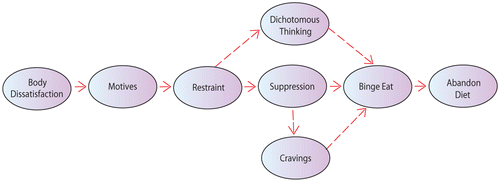In the most recent National Health Survey, over 2.3 million Australian adults reported being on a diet to lose weight.
Reviews of the dieting literature, however, consistently report that 95 percent of dieters regain the lost weight within a few years, with two-thirds regaining more weight than they initially lost. Despite this, the recommendations remain the same; ‘Eat less and move more’. During this year’s ‘Healthy Weight Week‘, CFIH urges the health community to consider how these recommendations might be either (1) inaccurate or (2) accurate but unattainable (and either way, unhelpful).
In a recent publication, CFIH Director, Dr. Kiera Buchanan, and colleagues proposed and tested a multivariate model aimed at explaining how and why diets fail. The findings concluded that, particularly in those individuals with high levels of body dissatisfaction, going on a diet for the purpose of weight-loss prompts dietary restriction which precipitates thought suppression and dichotomous thinking, both of which are linked to food cravings and disinhibited eating. Such dietary lapses are often accompanied by increases in emotional distress, decreases in self-efficacy and subsequent, diet abandonment.

What to do instead?
The results of the study suggest that discouraging a focus on weight-loss and encouraging a focus on health improvement can better motivate and support patients to improve their health. Here are 5 reasons why;
- Individuals who are focused on health, rather than appearance (i.e., weight loss), tend to make changes which are less drastic, reducing the risk of dichotomous thinking, food cravings and disinhibited eating.
- Through changes being more sustainable and less likely to result in binge eating, individuals with a health focus report higher levels of self-efficacy (which is consistently linked to the maintenance of health behaviours) than those with a weight-loss focus.
- In many cases, the behaviours commonly associated with improving health are the same behaviours recommended in weight-loss interventions (i.e., reduce alcohol consumption, increase consumption of fresh fruit and vegetables, exercise regularly, etc.). However, focusing the rationale for the behaviour change from one which is weight-focused to one that is health-focused, decreases the negative emotion attached to the intervention.
- While dieting and weight-loss focused interventions promote self-directed blame, hostility, and criticism (a negative predictor of physical and emotional health), health-focused interventions foster self-care and self-compassion (linked to improvements in physical and emotional health).
- Interventions aimed at improving health, in the absence of weight-loss, have demonstrated improvements physiologically (i.e. blood pressure and lipids), behaviourally (i.e. increased physical activity and reduced eating pathology) and emotionally (i.e. improved self-esteem and body dissatisfaction), suggesting that health can be improved in the absence of weight-loss.
How to redirect patients’ focus
- Talk in terms of non-weight related indicators of health or illness: Provide the patient with the biological indicators of their health/risk profile (i.e., high blood pressure, high blood sugar levels, high cholesterol, etc.) rather than discussing weight, BMI, waist circumference, etc.
- Provide a behavioural intervention aimed at targeting this specific health indicator: Remember that “weight loss” is not a behaviour but rather a possible outcome of changes in behaviour.
- Encourage the patient to make small, sustainable changes that can be gradually built upon over time. The more confident a patient feels about their ability to implement and sustain a change, the more likely the change is to be implemented and maintained over time. Simultaneously, the greater success a patient experiences the more motivated and confident in their ability they will become.
- Monitor progress and reinforces changes (or lack thereof) through these same indicators of health. Refrain from weighing/measuring patients (as this reinforces a focus on weight loss, rather than health improvement) and instead, continue to monitor other indicators of health (i.e., blood pressure, cholesterol, blood sugar levels, etc.).
- Discourage your patient’s focus on weight loss through responding to their comments concerning weight in a neutral manner and seek to remind them that;
- focusing on weight causes unnecessary distress and unhappiness,
- it increases the likelihood of making drastic changes, which do more harm than good, and
- weight loss itself is not linked to improvements in health, but rather the behaviours that are linked to weight loss leads to improvements in health.
If you’re interested in learning more about how you can support your patients to improve their health through redirecting their attention away from weight, contact Centre for Integrative Health on (07) 3161 0845 or via email.


